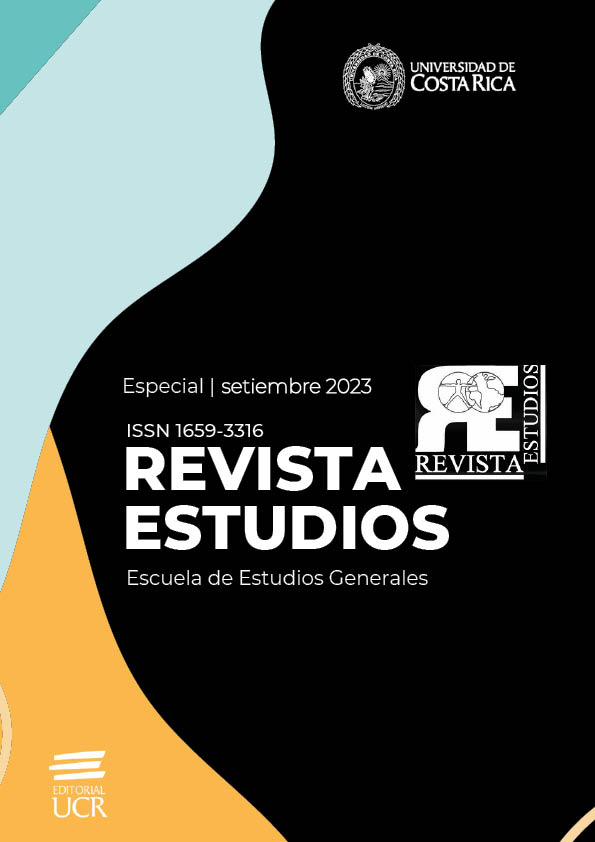Abstract
Landscapes are socially constructed in everyday life from the present, based on values and meanings that in the past had make it, thus inheritance, it implies an aspiration to remember in the future the spacial shape which have given its figure and meaning. Despite the political and economic processes that have promoted the invisibility of certain particular landscapes, art can be outlined as a strategy for the dissemination and visibility of cultural codes that were systematically forgotten. Hence, Peralta in Turrialba, is presented as an open-air gallery, where the community redeems through art, past landscapes which make sense in the present, and will be objects of desire and dreams in the future. The article discusses the artistic expressions surrounding the central park of Peralta, showing shared values in the landscape building. Imaginaries and presence/absence, crystallized regarding art and landscape.
References
Aguilar, N. (29 de julio de 2012). Pueblo sobrevive a duras penas sin el ferrocarril. Periódico Al Día. http://wvw.aldia.cr/ad_ee/2012/julio/29/nacionales3257252.html
Chacón, V. (31 de octubre de 2012). Pobladores de Peralta de Turrialba reclaman a Unión Fenosa por cambios en el Río Reventazón. Semanario Universidad. https://historico.semanariouniversidad.com/pais/pobladores-de-peralta-de-turrialba-reclaman-a-unin-fenosa-por-cambios-en-el-ro-reventazn/
Cruz, J.M. (30 de julio de 2021). Visitamos el olvidado pueblo de Peralta”. Teletica.com. https://www.teletica.com/masqn/visitamos-el-olvidado-pueblo-de-peralta_291834
Leiva, E. J. (23 de agosto de 2013). Recordando el ferrocarril en Peralta de Turrialba. Mi Cartago.com. http://www.micartago.com/index.php?news=5238
Masís, F. (31 de octubre de 2019). Pueblo turrialbeño abandonado por el ferrocarril se llenará de vida en competencia de kayak. La Nación. https://www.nacion.com/puro-deporte/otros-deportes/pueblo-turrialbeno-abandonado-por-el-ferrocarril/4deaxrnlxfed5bllaxlrtd5vie/story/
Milani, R. (2008). Estética y crítica del paisaje. En: El paisaje en la cultura contemporánea. (pp. 45-66). Biblioteca Nueva.
Murillo, C. (1995). Identidades de hierro y humo: la construcción del ferrocarril al Atlántico 1870-1890. Revista de Historia, (32), 251-255.
Nogué, À. (2008). El paisaje en el arte contemporáneo: de la representación a la experiencia del paisaje. En: El paisaje en la cultura contemporánea. (pp. 155-168). Biblioteca Nueva.
Nogué, J. (2007). La construcción social del paisaje. Biblioteca Nueva.
Peraldo, G. (1998). La deslizable historia del ferrocarril al Caribe de Costa Rica. Anuario de Estudios Centroamericanos. 24(1/2).
Rodríguez, E. (31 de mayo de 2016). Peralta, el pueblo que se niega a morir. Repretel.com. https://www.repretel.com/noticia/peralta-el-pueblo-que-se-niega-a-morir/
Soto, R. (2021). Paisajes racializados y fronteras identitarias en Costa Rica: relatos de viajeros y el ferrocarril al Caribe (1885-1930). Anuario de Historia Regional y de las Fronteras. 26(2).
Comments

This work is licensed under a Creative Commons Attribution-NonCommercial-ShareAlike 4.0 International License.
Copyright (c) 2023 A. Mario Sibaja Solís, Aaron Blanco Delgado


